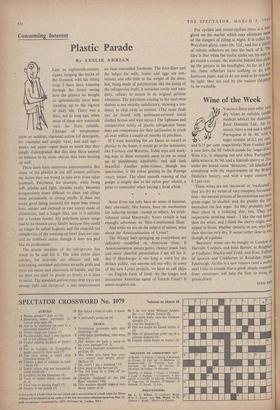Consuming Interest
Plastic Parade
By LESLIE ADRIAN There have been enormous improvements. But many of the plastics in use still cannot perform the duties they are trying to take over from other materials. Polythene, for example, while being soft, pliable and light, abrades easily, becomes progressively more difficult to clean and clings most persistently to strong smells. It does not make good lining material for waste bins (metal bins, noisier and inclined to rust unless made of aluminium, had a longer life), nor is it suitable for a kitchen funnel. My polythene picnic mugs had to be thrown away finally because they could no longer be called hygienic and the cheerful red complexion of the washing-up bowl does not con- ceal its stubborn stains, though it does not peel like its predecessor.
The plastic invasion of the refrigerator has much to be said for it. The solid nylon door catches, for example, are efficient and self- lubricating, moulded polythene ice-cube grids and trays are easier and pleasanter to handle, and the ice does not stick to plastic as firmly as it does to metal. The moulded polystryrene drip trays are strong, light and rustproof, a real improvement on their enamelled forebears. The door-liner and the ledges for milk, butter and eggs are con- venient and add little to the weight of the door, but, being made of polystryrene like the lining of the refrigerator itself, it scratches easily and once dirty, refuses to return to its original pristine whiteness, The polythene coating to the steel-wire shelves is not entirely satisfactory, showing a ten- dency to chip away at corners. (The same fault can be found with polythene-covered metal clothes horses and wire sieves.) The lightness and comparative safety of plastic refrigerator boxes does not compensate for their inclination to crack all over within a couple of months of purchase.
If I were searching for an Oscar to award to plastics in the home, it would go to the laminates, like Formica and Warerite. Table tops and work- ing tops in these materials seem to me to stand up to punishment admirably, and still look beautiful. Another prize-winner, though less spectacular, is the nylon gearing in the Prestige rotary beater. The silent smooth running of this gadget is largely due to the nylon gear wheels, a point to remember when buying a food whisk.
*
Some firms not only have no sense of humour, they obviously, like horses, have no mechanism for inducing nausea—except in others. An estab- lishment called Maternally Yours (which is bad enough) advertises its 'Heir-Conditioned Shop.'
And while we are on the subject of names, what about the Americanisation of Lyons?
The Wimpy bars springing up everywhere are definitely modelled on American lines; if Americanisation means gayer, cleaner snack bars and more cheerful presentation I am all for it. But if Hamburger is too long a word for the British public, can anyone tell me why, in some of the new Lyons projects, we have to call chips —an English form of food—by the longer and inaccurate American name of French Fried? It seems stupid to me. For cyclists and motor-cyclists there is a new glove on the market which may eliminate some of the dangers of riding at night. It is called the Wayabout glove, costs 10s. ltd., and has a clutch of minute reflectors set into the back of it. The idea is that when the cyclist sticks out his mitt to go round a corner, the motorist behind him picks up the gesture in his headlights. As far as I can see, these reflectors have nothing to do with, luminous paint, and so do not need to be renewed by light; they are said by the makers (Morley) to be washable.


































 Previous page
Previous page